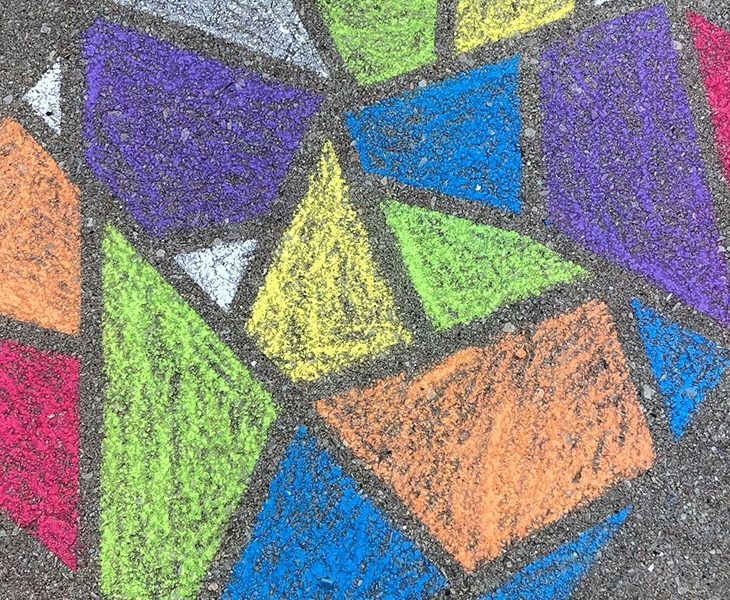Centering Radical Mercy This Ramadan
April 27, 2020

Muslims around the world begin their Ramadan fasts based on the lunar calendar, upon sighting the birth of a new moon. A small barely visible crescent launches us into fasting days and prayerful nights, into community and solitude simultaneously. While we may stand together in communal prayer, we are also apart in the most intimate of salutations with God during these Ramadan nights. The moon is our constant companion for as it matures, so does Ramadan. When it is reborn, we close our month of fasting with the celebration of Eid.
But this year’s Ramadan is different. Our communal rituals are also contained in the solitude of our quarantined homes. For our family, we felt this deeply on the second day of Ramadan, which was my 8-year-old son’s first ever, full day of fasting. He excitedly woke up at 3:30am for suhoor, the pre-dawn meal, and survived the whole day much to our surprise. When we sat down to break our fast at sunset, called iftar, he proclaimed his happiness for completing what felt like an impossible feat, and his sadness for not being able to share it with his grandmother who is quarantined elsewhere. It is in those moments that I think perhaps we are all more like the moon than we realize – always in transition, always partially visible, always traveling in a cycle of light and darkness. For even when the moon is visible in its full glory, we only see but one side.
There are many ways that one can see themselves through this Ramadan of separate-togetherness. Some are focused on their private worship, some on creating community through Zoom gatherings. Some are spending their time organizing acts of service like providing meals or groceries for those in need. Most of us will likely engage in some combination of these new rituals. As we go through those new ways of practicing Ramadan, we will need to embrace grace and mercy towards others and, most importantly, towards ourselves. Like the moon, we will shine our light in moments of joy, while also navigating through dark moments of loneliness and despair.
Muslim Chaplains and students across the country are also trying to make sense of how to keep their communities connected and how to lean into new Ramadan routines. While there are no daily campus iftars, people are finding ways connect through creating community virtually through breaking fast together and engaging in learning sessions called “halaqa’s.” Many communities are also finding ways to put their mercy into practice. Omer Bajwa, Director of Muslim Life at Yale University, spoke to MSNBC yesterday about how Connecticut Muslims are offering free “drive-thru” meals for those who need it. The Murfreesboro Muslim Youth and Project Runway Star, Ayana Ife, have started an initiative to make face masks for healthcare professionals in Rutherford County, TN, and have provided 1400 masks so far through their efforts. Imam Khalid Latif, Executive Director and Chaplain for the Islamic Center at New York University, raised over $270,000 dollars for the NYC COVID 19 Ramadan Emergency Support Fund to provide financial support for individuals and families who are struggling during this pandemic. There are no magic equations for finding meaning in this Ramadan, only small and big acts of mercy that will bond our commitments to each other.
The opening verse for every chapter of the Quran, In the name of God – the most compassionate, the most merciful (Bismillah Ar-Rahman Ar-Rahim), invokes God with the attributes of compassion and mercy. The Prophet Muhammad said, “People who show mercy to others will be shown mercy by the All-Merciful. Be merciful to those on earth and he who is in the heavens will show mercy unto you.” It is in this foundational value of Islam – Mercy – that I seek refuge in during these Covid-times. In our home, we are trying to practice small and big mercies. Giving ourselves permission to do the basics, to fulfil what feels possible and achievable under the emotional and physical weight of isolation and social distancing. Our iftar meals are as simple or as extravagant as we have capacity for, our days are about sustaining the balance of two working parents who are also homeschooling three children, our nights are less structured and have involved copious amounts of reading from the Harry Potter series at bedtime. Our weekends are a mixture of an intentional slow pace along with zoom check ins with family and friends, spending as much as time outside as the weather allows, and, of course, reading as much Harry Potter as possible.
As the moon blossoms into its full glory, I pray that we blossom with it. I pray that our hearts are tuned into the mercies we need for ourselves, and the compassion we must show others. As the moon transitions, I hope that we also transition with it, turning inward for our spiritual sustenance, and extending outward to build and celebrate with community in all ways possible in these moments. Ultimately, I pray that we come out of this Ramadan knowing ourselves and our community just a bit more intimately than before. For when we gaze the skies to spot the newborn crescent that brings forth the celebration of Eid, I hope we may also see our north star.
Share
Related Articles
American Civic Life
Is Ramadan More Challenging for Neurodiverse Muslims? Experts Say Yes.
American Civic Life
American Civic Life



